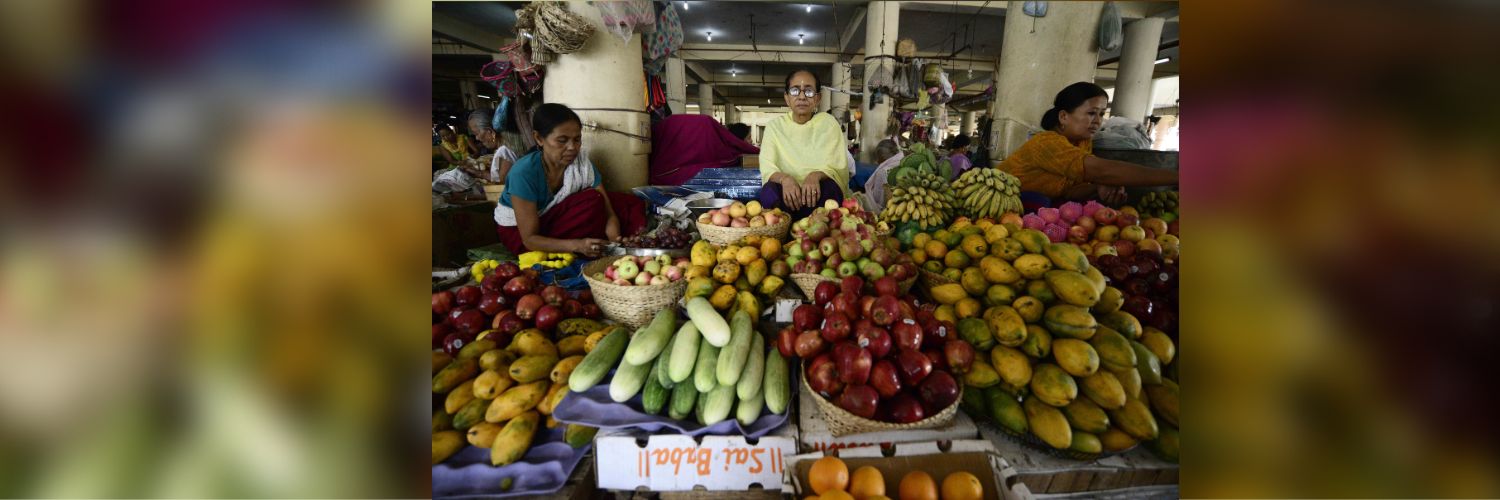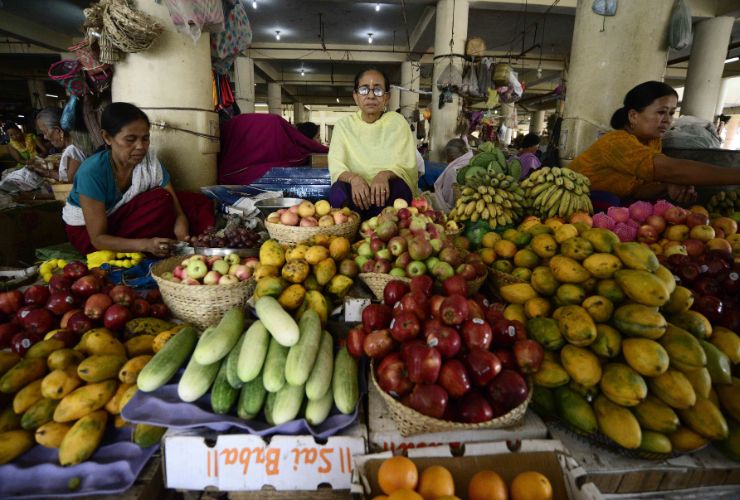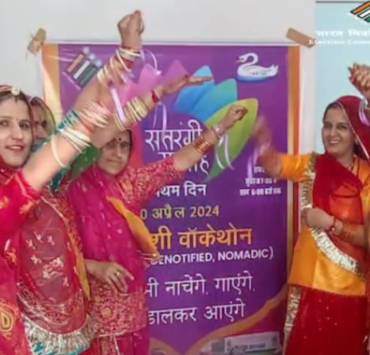
By Ninglun Hanghal

With the Lok Sabha elections just a few days away, there have been reports of fresh violence in Manipur, with killings and attacks on villages in different parts of the state, especially along the borders and peripheries of districts.
At the time of writing, a total, 24-hour shutdown has been announced across the district of Kangpokpi on April 14-15 in response to the brutal killing of two of villagers. The district is inhabited by the Kuki-Zo communities.
Although there was relative calm across the state for a few weeks before the latest outbreak of violence, tension has built up once again. The state is gearing up for the general election of 2024 with friction and uncertainty creating an uneasy atmosphere.
When the countdown to the general election began after poll dates were announced in mid-March, the violence that had erupted in the state almost a year ago and had flared up periodically since then seemed to have subsided. However, now that appears to have been just the lull before another storm.
The women of Manipur have long been well-known for their activism in the socio-political sphere. Their active participation in the ongoing conflict in the state provides recent evidence of their traditionally pro-active role in society. Their latest intervention can be seen at the forefront of the election process, some actively campaigning and others calling for boycotts.
Manipur will go to the polls in two phases: the first round of voting will take place on April 19 and the second on April 26. The state has two parliamentary seats. During the upcoming general election, seven candidates will be contesting in the Inner Manipur constituency while four will be contesting in the Outer Manipur constituency.
Not a single woman has filed a nomination in the state this time. During the 2019 election, too, there were no female candidates. The first Manipuri woman to be elected to the Lok Sabha was Kim Gangte of the Communist Party of India (CPI) in 1998; she represented the Outer Manipur constituency. It was the first time the CPI had won the constituency as well.
Elections to the state’s own Legislative Assembly usually witness more fanfare and festivities in Manipur. Parliamentary elections do not generate as much excitement and enthusiasm. The turnout for Lok Sabha polls is relatively low compared to state elections. With only two MPs in Parliament, the state is not in a position to make much of an impact on the national scene. This reality makes the Lok Sabha elections less interesting for people in Manipur.
During the 2019 general election, Manipur had a total of 19,39,244 voters; of them 9,95,773 were female while 9,43,426 were male and 45 registered themselves as third gender. With the number of the female voters slightly higher than that of males, the voter turnout also showed a higher number of females than males. Except for seven Assembly constituencies located in remote tribal areas, all others recorded a higher female turn-out compared to the male turn-out.
A total of 20,26,623 voters are registered in the state for the upcoming national election; of them 9,79,678 are male, 10,46,706 female and 239 are registered as third gender. This time the number of female electors exceeds that of male electors by 67,028.
In most past elections in Manipur, whether state or national, a serpentine queue of women could be seen waiting to exercise their franchise. However, this time things appear to be different and the turnout rate among women may not be as high. A large number of women seem to be saying that they will abstain from voting in the Lok Sabha polls. Both in the Imphal valley and in the tribal hills, groups of women have stated their intention to boycott the election.
This development comes against the backdrop of the present situation in the state, with the prolonged violent conflict between Meitei and Kuki-Zo communities having resulted in the displacement of over 60,000 people and the deaths of more than 100 individuals. The crisis has continued over a year, with no visible signs of the situation improving in the near future. Displaced families are still taking shelter in relief camps.
Women vendors of the world-famous Nupi Keithel – all- women markets in the state capital, Imphal (also known as Ema Keithel or Khwairamband Bazaar) – have declared their non-participation in the Lok Sabha elections. They point out that the ongoing Manipur crisis has remained unresolved even after 11 months (and counting). For them, solving the problem is more crucial than any election, certainly a Parliamentary election. These women vendors are among the most influential groups of women in Manipur.
In the Langthabal Assembly Constituency in Imphal West, the Meira Paibis or women torch bearers (another well-known group of women), have announced their decision to boycott the upcoming national election as well. The reason is their dissatisfaction with the handling of the violence by the government in the state as well as the centre.
Meanwhile, women in relief camps located in Kakching have also stated that they will refrain from casting their votes. Their stand is that they will not participate in any election until they are able to return to their homes.
A large number of both Meitei and Kuki-Zo women are still stuck in relief camps across various districts. Even as arrangements are being made to enable them to vote, there is reportedly no enthusiasm for the elections among them. It is feared that they may fall into the trap of being wooed as a “vote bank” or lured or forced into voting in a particular way.
In Manipur, a form of “booth capture” is not uncommon, with party workers using the opportunity of voters staying away from polling centres to cast proxy votes using their names. This time, with many women having already declared their intention to not exercise their franchise, there are even more chances of this happening.
In addition, women calling themselves the Global Kuki-Zo – a relatively new group of Kuki-Zo women based across the country and in various parts of the world – have also called for a boycott of the elections because of the injustices faced by their communities in the violent conflict that erupted last year and still remains unaddressed.
While women’s groups in several parts of the state have announced their decision not to participate in the upcoming election, many other women appear to be actively involved in election campaigns for candidates of their choice.
Given their active participation in politics in general and proactive engagement in electoral politics in particular, there is no doubt that women voters constitute a deciding factor in elections held in Manipur. Accordingly, women have emerged as specific targets that any political party or candidate tries to woo. Candidates campaigning among women folk in Manipur is a familiar sight. They indulge in high pitched speeches, making a variety of promises, and a large number of women applaud them.
In the run-up to the upcoming election, party workers, supporters and campaigners have maximised their propaganda, mostly using women’s voices, videos, and images to appeal to voters. Social media are flooded with videos of women expressing their opinions and making their preferences among candidates known. Such messaging is shared in various groups and across different platforms as a means of electioneering.
A lot of misinformation and mischievous information are also being spread using women’s images and videos. In one such video, a large number of women can be seen coming out of the huge gate of a building described as the Chief Minister’s bungalow. The implication was that the women were visiting the CM to get “cash for votes.”
There were several other such examples. On one Facebook page, a viral video of an apparent “news report” was uploaded, which suggested that a particular political party had submitted a request to the Chief Electoral Officer (CEO) to investigate why a large number of women are frequently visiting the CM’s bungalow while the Model Code of Conduct is in place. The “news report” also mentioned that, while the reasons for the women constantly coming in and out of the CM’s bungalow are so far unknown, the visits are believed to be related to the upcoming election.
With the unresolved Manipur conflict in the background, there is disquiet in the state over the general election. Except in a few places there is hardly any of the usual noise or festivities traditionally associated with the polls. Under the circumstances, it is mainly women who are either actively expressing their thoughts about the elections and candidates or raising their voices about why they are refraining from participation in the entire process.
Groups like the infamous Arambai Tenggol, a Meitei radical group, have issued warnings that there should be no loud election campaigns and no big road shows, especially with the use of loud speakers or gatherings of large numbers of people.
Meanwhile, in the tribal hills, civil society organizations like the Indigenous Tribal Leaders Forum (ITLF) and other Kuki-Zo apex bodies – like the Kuki InnPi – have announced that no Kuki-Zo will contest the election this time. Accordingly, no Kuki-Zo candidate has filed a nomination.
Till now the worry has been whether the relative quiet that prevailed in the state until recently was just the calm before the storm. Given the present situation, the concern is whether elections can be held in such a tense situation, amidst sporadic violence. Even as people in the state appear to be keeping a safe distance from the electoral process, there is now high probability of bloody confrontations.
Whatever happens or does not happen, one thing is certain in the run-up the upcoming Lok Sabha elections in Manipur: women are the deciding factor that will determine which way the numbers will swing. Whether they vote or abstain from voting, their presence or absence is likely to determine victory or loss for the candidates in the fray.
Ninglun Hanghal is a freelance journalist from Manipur, presently based in Guwahati. She was a Laadli Media Fellow in 2020 and received the International Women’s Media Foundation’s Howard G. Buffett Fund in 2022.




